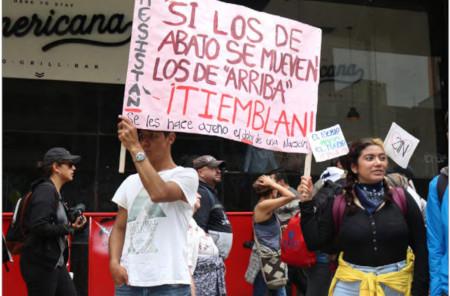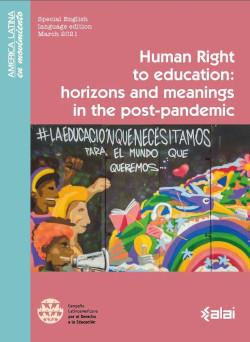Criminalization and human rights violations
There are numerous examples and countries in which police repression, persecution and political harassment have been the response of the States to the mobilization of students in Latin America and the Caribbean.
- Opinión

| Article published in ALAI’s magazine No. 551: Human Right to education: horizons and meanings in the post-pandemic 05/03/2021 |
Reflections based on the cases of high school and university students in Chile, Colombia, Nicaragua and Honduras.
In recent years, there has been an increase in the repressive response of many States to the demands made by students and teachers in the face of coercive actions implemented by the executive powers.
Added to this is the coming into force of laws, decrees, protocols and reforms to criminal law, which in government practice function as instruments to marginalize dissident positions and discourage the exercise of democratic freedoms. This despite being contrary to regional and international regulations that protect human rights.
Therefore, CLADE assigns particular relevance to the "Regional Report on Criminalization and Human Rights Violations"[1], which is dedicated to the situation of students in Latin America and the Caribbean, who in recent years have taken the lead in the defense and promotion of the Human Right to Education and other human rights.
There are numerous examples and countries in which police repression, persecution and political harassment, use of lethal weapons, raids, arbitrary detentions, prosecutions without legal guarantees, among others, have been the response of the States to the mobilization of students in Latin America and the Caribbean.
Chile
The student sector in Chile has stood out as one of the most mobilized in the region, in which several moments stand out, such as the year 2001 with the mochilazo, 2006 with the penguin movement, 2011 with the demand to end education for profit and recently, in 2019, when various university and high school organizations called for a national mobilization in repudiation of the decisions taken by the executive that had a negative impact on the educational community.
Meanwhile, we see how the State persists in offering world opinion an image of Chile as a stable and safe oasis of democracy; while at the same time legitimizing the actions of the State repressive forces with the discourse of protecting public order, by which it disregards the demands of the students and of the civilian population that joins the demonstrations.
From the material gathered in the interviews in the case of Chile, it is clear that there is a strong presence of state actors who participate in the processes of criminalization of the student movement. In this vein, the Executive Power, the Legislative Power, the Judicial Power and the Carabineros can be distinguished.
Colombia
In Colombia, while in recent years, certain examples stand out, such as the case of a student killed during a university demonstration in 2005 and more recently, in November 2019, the death of another student as a result of the excessive use of force by the Mobile Anti-Riot Squad (ESMAD) of the National Police, the fact is that Colombia has been experiencing this type of repression for a long time, even after the signing, in 2016, of the latest peace agreements, in which the situation of human rights defenders (HRDs) is contemplated, in terms of guaranteeing their rights, risk prevention and strategies to ensure their safety and comprehensive protection.
From a hearing held with the IACHR in 2019, data from civil society organizations enumerated, between 2010 and the first half of 2019, at least 3,434 threats against HRDs; from August 2018 to June 2019, at least 632 threats were recorded and in 2019, the OHCHR documented 108 murders of HRDs.
Some of the most frequently expressed demands by the Colombian educational community include: guaranteeing and increasing resources that allow the State to provide free public education; decent conditions for the teaching profession, with fair salaries and working hours; educational centers as territories of peace and social justice, free from all types of violence; the implementation of post-conflict reparation processes established in the peace agreements; full respect for the right to freedom of expression and teaching, the physical integrity of students, teachers and other actors of the educational community, as well as their right to association and social protest.
Honduras
Since 2009, Honduras has been socio-politically convulsed as a result of the coup d'état against former President Manuel Zelaya, a year in which the student movement increased its mobilization, demonstrating against the various governments that have emerged since that event, which have promoted privatization policies, democratic restrictions and reduced university autonomy, although it was the demonstrations of 2015 that had the greatest international repercussions.
The latest decade of Honduras' modern history has been characterized by a significant increase in murders, criminalization and persecution of students mobilized around the country. According to data provided by the National Observatory of Violence, from January 2010 to May 2018, 1,522 students from all educational levels in Honduras have been killed in contexts of protests, strikes, and violence by armed groups.
Nicaragua
For Nicaragua, the year 2018 went down forever in history when a socio-political upheaval took place that had repercussions at the international level due to the excessive repression with which the Nicaraguan State and its executive branch responded to demonstrations led by students. These demonstrations were expressions of their discontent, initially due to the lack of attention to the emergency initiated by a forest fire in one of the most important natural reserves, subsequently to reforms to the social security law, which overlapped with accumulated discontent over the dismantling of democracy, its institutions, citizen participation and access to public information, as well as impunity for acts of violence and partisanship in education and demands for access to other rights.
The dismissal of student and civil society demands, through public speeches by current President Daniel Ortega and Vice President Rosario Murillo, where they expressed exotic expletives such as "tiny groups, Satanists, traitors, bloodsuckers, terrorists, among others", was accompanied by political harassment and persecution by their close associates, sympathizers and national police, physical and psychological torture, use of lethal weapons, raids, arbitrary detentions, unconstitutional prosecutions, closure of spaces for denunciation, murders, kidnappings and disappearances. The IACHR reports 325 people who lost their lives, however, official figures recognize 195.
(Translation ALAI)
Foro de Educación y Desarrollo Humano de la Iniciativa por Nicaragua (Education and Human Development Forum of the Initiative for Nicaragua) (FEDH-Ipn) http://www.fedh-ipn.org/
Foro Dakar / Honduras (Dakar Forum / Honduras) http://forodakarhonduras.info/
[1] For further information (in Spanish) see: Criminalisation and Violation of Students´Human Rights in Latin America and the Caribbean









